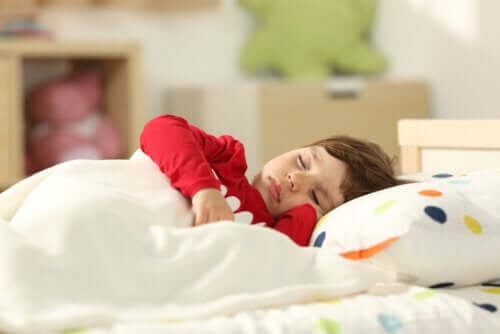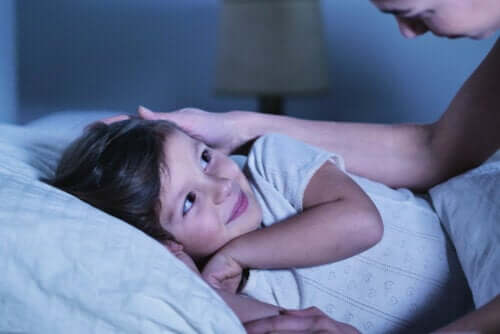Children and Sleep: Common Problems and Solutions

Sleeping is one of the most important and necessary activities for human beings. During sleep, we organize and assimilate all the experiences and knowledge we acquire. This is particularly relevant in the case of children, because they receive new information to assimilate all the time. In this article, you’ll learn more about children and sleep issues.
Lack of sleep may affect the proper functioning of the brain and generate physical discomfort. For this reason, we’d like to talk about the difficulties related to child sleep.
Children may encounter sleep problems in three different moments: when they’re falling asleep, when they’re sleeping and when they wake up. Thus, there are different types of difficulties. Next, you’ll learn more in depth about the different causes, effects and approaches.
Difficulties in falling asleep
Many children have a hard time falling asleep. Insomnia is one of the most common difficulties in child sleep. Even though its main causes are varied, you should always bear in mind that sleep is a habit to be acquired. To set a proper sleep schedule, you need to follow certain rules and establish a routine.

Now, it’s time to talk about sleep hygiene. Children are learning to sleep (in a healthy and proper way), and there are many factors that facilitate this process:
- Going to bed and getting up at the same time every day. This helps the body synchronize sleeping and being awake.
- Avoiding stimulating food and activities at the end of the day.
- Following a routine before going to bed prepares your child to sleep. You should repeat the same activities every night, like brushing their teeth, preparing clothes for the following day, going to bed and reading a story. Setting the right environment in the bedroom. It should be quiet, with faint lights and a nice temperature.
Maybe, some children suffer from insomnia because they’re afraid of the dark. This is a common fear in certain stages of development. However, if this highly interferes in the child’s life, you should visit a psychologist.
Difficulties in staying asleep
While they’re sleeping, children may encounter different situations that affect their sleep. Some of the most common ones are night terrors, sleepwalking and nightmares. The last two belong to stage 3 and 4, which are the periods of deep sleep. On the other hand, nightmares occur during REM sleep.
These episodes are very common during childhood and may disappear in time. What’s more, during sleepwalking and night terrors, children don’t receive external stimuli and, the following morning, they don’t remember them.
So, you should just take your children back to bed and stay with them until the episode fades away, making sure they don’t get hurt. It’ll end and they’ll forget about it.

On the contrary, after having a nightmare, children stay alert. And, if they’re very young, they might even think the nightmare was real. So, in this case, you need to calm your children down, comfort them and stay by their side until they go back to sleep.
A proper sleep hygiene may help prevent these episodes. Furthermore, you can help your children by preventing them from experiencing stressful or unpleasant situations.
Children and sleep: difficulties while waking up
It’s quite obvious that suffering from insomnia or having any other episode during sleep won’t help them rest well. Children may suffer from daytime sleepiness and irritability. And, if having difficulties while waking up is very common, your child may suffer from delayed sleep phase syndrome (DSPS). If this is the case, you should find out the specific treatment.
In conclusion, sleep is a habit that children acquire. And, certain difficulties are part of their growth. To ease the effects of these difficulties, children should have a physically active lifestyle, a relaxed mind and a proper sleep hygiene. However, if this becomes a serious issue, you should ask for professional help.
Sleeping is one of the most important and necessary activities for human beings. During sleep, we organize and assimilate all the experiences and knowledge we acquire. This is particularly relevant in the case of children, because they receive new information to assimilate all the time. In this article, you’ll learn more about children and sleep issues.
Lack of sleep may affect the proper functioning of the brain and generate physical discomfort. For this reason, we’d like to talk about the difficulties related to child sleep.
Children may encounter sleep problems in three different moments: when they’re falling asleep, when they’re sleeping and when they wake up. Thus, there are different types of difficulties. Next, you’ll learn more in depth about the different causes, effects and approaches.
Difficulties in falling asleep
Many children have a hard time falling asleep. Insomnia is one of the most common difficulties in child sleep. Even though its main causes are varied, you should always bear in mind that sleep is a habit to be acquired. To set a proper sleep schedule, you need to follow certain rules and establish a routine.

Now, it’s time to talk about sleep hygiene. Children are learning to sleep (in a healthy and proper way), and there are many factors that facilitate this process:
- Going to bed and getting up at the same time every day. This helps the body synchronize sleeping and being awake.
- Avoiding stimulating food and activities at the end of the day.
- Following a routine before going to bed prepares your child to sleep. You should repeat the same activities every night, like brushing their teeth, preparing clothes for the following day, going to bed and reading a story. Setting the right environment in the bedroom. It should be quiet, with faint lights and a nice temperature.
Maybe, some children suffer from insomnia because they’re afraid of the dark. This is a common fear in certain stages of development. However, if this highly interferes in the child’s life, you should visit a psychologist.
Difficulties in staying asleep
While they’re sleeping, children may encounter different situations that affect their sleep. Some of the most common ones are night terrors, sleepwalking and nightmares. The last two belong to stage 3 and 4, which are the periods of deep sleep. On the other hand, nightmares occur during REM sleep.
These episodes are very common during childhood and may disappear in time. What’s more, during sleepwalking and night terrors, children don’t receive external stimuli and, the following morning, they don’t remember them.
So, you should just take your children back to bed and stay with them until the episode fades away, making sure they don’t get hurt. It’ll end and they’ll forget about it.

On the contrary, after having a nightmare, children stay alert. And, if they’re very young, they might even think the nightmare was real. So, in this case, you need to calm your children down, comfort them and stay by their side until they go back to sleep.
A proper sleep hygiene may help prevent these episodes. Furthermore, you can help your children by preventing them from experiencing stressful or unpleasant situations.
Children and sleep: difficulties while waking up
It’s quite obvious that suffering from insomnia or having any other episode during sleep won’t help them rest well. Children may suffer from daytime sleepiness and irritability. And, if having difficulties while waking up is very common, your child may suffer from delayed sleep phase syndrome (DSPS). If this is the case, you should find out the specific treatment.
In conclusion, sleep is a habit that children acquire. And, certain difficulties are part of their growth. To ease the effects of these difficulties, children should have a physically active lifestyle, a relaxed mind and a proper sleep hygiene. However, if this becomes a serious issue, you should ask for professional help.
All cited sources were thoroughly reviewed by our team to ensure their quality, reliability, currency, and validity. The bibliography of this article was considered reliable and of academic or scientific accuracy.
- Sanz, E. (2019g, 1 octubre). El síndrome de la fase del sueño retrasada. Recuperado 10 enero, 2020, de https://lamenteesmaravillosa.com/el-sindrome-de-la-fase-del-sueno-retrasada/
- Convertini, G., Krupitzky, S., Tripodi, M. R., & Carusso, L. (2003). Trastornos del sueño en niños sanos. Arch argent pediatr, 101(2), 99-105.
This text is provided for informational purposes only and does not replace consultation with a professional. If in doubt, consult your specialist.








